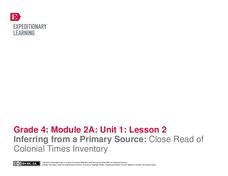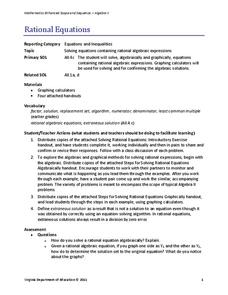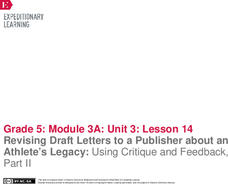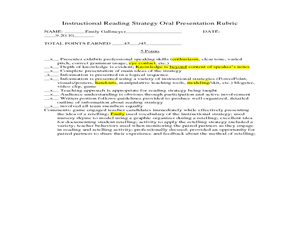Curated OER
Our Town: Using Song Lyrics in the Classroom
Bruce Springsteen’s “My Hometown” and Billy Joel’s “Allentown” motivate young lyricists to craft poems about their own home town. Groups compare the two songs, identifying details, symbols, and conflicts. Individuals then picture a place...
Curated OER
Opposite Grapevines
There are really only four basic moves in this line dance. Those dance moves are: grapevine, slide, marching, and then dipping and clapping. Each 8-count is repeated twice, for a total of a 64-count dance. The unique addition to this...
EngageNY
Inferring from a Primary Source: Close Read of Colonial Times Inventory
Teach your class about colonial America through an examination of primary documents. First though, start vocabulary notebooks for content-specific and academic vocabulary. Pupils can keep this record during the entire module. Once this...
Macmillan Education
Get Thinking
Have a go at this exercise in thinking by asking thinkers to think about thinking, of what they think of, and what they think about. The worksheets in the packet provide much food for thought.
Education Outside
Animal Homes in the Garden
First graders journey to the school garden to examine the habitats of garden animals. Using the provided graphic organizer, kids locate and sketch a critter and its habitat before returning it to its home.
EngageNY
Adding and Subtracting Expressions with Radicals
I can multiply, so why can't I add these radicals? Mathematicians use the distributive property to explain addition of radical expressions. As they learn how to add radicals, they then apply that concept to find the perimeter of...
Caucus 101
Linkage Institutions: Interest Groups: Option A
How are elections really run and won? Learn about special interest groups, super PACs, and lobbyists with an engaging lesson about the caucus process. Young voters research specific interest groups and analyze their part in previous and...
EngageNY
Secant Angle Theorem, Exterior Case
It doesn't matter whether secant lines intersect inside or outside the circle, right? Scholars extend concepts from the previous instructional activity to investigate angles created by secant lines that intersect at a point exterior...
EngageNY
Normal Distributions (part 2)
From z-scores to probability. Learners put together the concepts from the previous lessons to determine the probability of a given range of outcomes. They make predictions and interpret them in the context of the problem.
Virginia Department of Education
Rational Equations
Provide guidance and practice of the useful skill: solving rational equations using both an algebraic and graphical approach. Pupils solve increasingly more difficult rational equations using algebraic methods. After, they...
Virginia Department of Education
Constructions
Pupils learn the steps for basic constructions using a straightedge, a compass, and a pencil. Pairs develop the skills to copy a segment and an angle, bisect a segment and an angle, and construct parallel and perpendicular lines.
Virginia Department of Education
Logic and Conditional Statements
If there is a conditional statement, then there is a hypothesis and conclusion. Pupils learn how to identify the parts of conditional statements. Class members continue to work with conditional statements and rewrite them in their many...
Virginia Department of Education
Independent and Dependent Variables
Investigate the relationship between independent and dependent variables. Individuals begin by identifying independent and dependent variables from different problem situations. Then, using specific guidelines, they create posters...
Virginia Department of Education
Arithmetic and Geometric Sequences
Future mathematicians learn about arithmetic and geometric sequences, as well as common ratios and differences as they complete a worksheet matching sequences with the algebraic expressions that represent them.
EngageNY
Launching the Module: Quotes about the Middle Ages
Pick a corner. Scholars receive a quote about the Middle Ages and then participate in a four corners activity by choosing a corner pertaining to their quotes. They then work in groups of three to discuss the bold words in their quotes....
EngageNY
Conducting Research: Asking and Answering our Questions about Rainforest Arthropods
Let's ask an expert. Scholars divide into groups to research and become experts on either ants or butterflies. Learners use task cards and text on their topic to complete a note catcher. At the end, they share their information with a...
EngageNY
Revising Draft Letters to a Publisher about an Athlete’s Legacy: Using Critique and Feedback, Part II
Let's get opinionated. Scholars participate in a peer critique and revision process using a fun activity called a Four Corners strategy. After incorporating classmates' feedback, individuals share their final drafts of their opinion...
EngageNY
The Painted Essay for Opinion Writing: Developing a Conclusion and Adding Linking Words
Let's get colorful! Scholars use the Painted Essay technique to analyze and color code the conclusion of a model essay. Working in small groups, pupils then write a conclusion paragraph for their draft editorials about offshore...
EngageNY
Group Discussions and Revision: Editorial Essay
Great minds think aloud! Pupils participate in the Fishbowl protocol, discussing their opinions about the Mary River mine proposal. As they share their thoughts, peers provide feedback about their thesis and supporting ideas.
EngageNY
Analyzing Point of View: Inferring about the Natural Disaster in Eight Days
Who is telling the story? Readers take a look at the text Eight Days to determine if the story is told in first or third person. They then discuss in groups and complete a shared writing activity to describe how the narrator's point of...
EngageNY
Speech Writing: Identifying Criteria for a High-Quality Introduction
Using a helpful resource, pupils watch a TED Talk of an opinion speech as they consider the criteria for a high-quality introduction. Scholars then engage in a shared writing process with the teacher to practice writing the introduction...
EngageNY
Speech Writing: Identifying Criteria for a High Quality Conclusion
Learning is never-ending. Scholars learn about effective conclusions as they continue watching a video of an opinion speech. After analyzing the speech's conclusion, they work in small groups to write an ending for their own speeches.
Curated OER
The Princess's Point of View
Everyone wants to be part of a royal family. Let your pupils experience the privilege of royalty by rewriting the story The Frog Prince from the point of view of the princess. While the story line remains the same, perspective is bound...
Curated OER
Retelling
Explore language arts by completing a story worksheet in class. Readers will identify the importance of plot, setting, and character while they write their own short story. They also retell their story to a classmate and participate in a...























